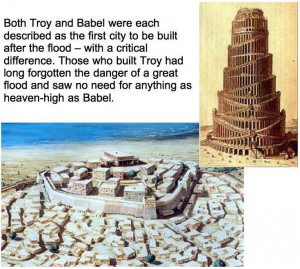Previous in this series:
- Plato’s and the Bible’s Ideal Laws: Similarities 1:631-637 (2015-06-22)
- Plato’s and Bible’s Laws: Similarities, completing Book 1 of Laws (2015-06-23)
- Plato’s Laws, Book 2, and Biblical Values (2015-07-13)
—
I love the way Old Testament books come alive as part and parcel of a long forgotten ancient world when I read other ancient writings expressing the same ideas and stories most of us in the “Christian world” have only ever known from the Bible. Reading Plato’s Laws brings home just how pre-modern and irrelevant the Bible is for today’s world — apart from vestigial myths and sacred beliefs a few modern institutions seek to preserve for various reasons.
Take the quaint way Genesis identifies precisely who was responsible for the invention of each of the civilized arts and crafts:
Kayin . . . became the builder of a city . . .
Ada bore Yaval,
he was the father of those who sit amidst tent and herd.
His brother’s name was Yuval,
he was the father of all those who play the lyre and the pipe.
And Tzilla bore as well — Tuval-Kayin,
burnisher of every blade of bronze and iron. (Genesis 4:17, 20-22, Everett Fox translation — primary intent of this translation is to capture the flavour of the Hebrew language. All Genesis quotations in this post are from this translation.)
Plato informs us (book 3 of Laws) that the ancient Greeks likewise had their eponymous inventors of the arts and crafts of civilization:
Cleinias For it is evident that the arts were unknown during ten thousand times ten thousand years. And no more than a thousand or two thousand years have elapsed since the discoveries of Daedalus, Orpheus and Palamedes – since Marsyas and Olympus invented music, and Amphion the lyre – not to speak of numberless other inventions which are but of yesterday.
Athenian Have you forgotten, Cleinias, the name of a friend who is really of yesterday?
Cleinias I suppose that you mean Epimenides.
Compare the reminder left to us by Hyginus: Continue reading “Plato and the Bible on the Origins of Civilization”

